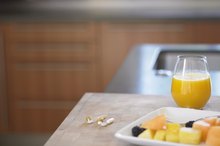What does fact checked mean?
At Healthfully, we strive to deliver objective content that is accurate and up-to-date. Our team periodically reviews articles in order to ensure content quality. The sources cited below consist of evidence from peer-reviewed journals, prominent medical organizations, academic associations, and government data.
The information contained on this site is for informational purposes only, and should not be used as a substitute for the advice of a professional health care provider. Please check with the appropriate physician regarding health questions and concerns. Although we strive to deliver accurate and up-to-date information, no guarantee to that effect is made.
Doctors often prescribe warfarin to thin the blood and prevent damage from blood clots. While you do not need a special diet when taking warfarin, your vitamin K intake needs to stay the same from day to day. Your ability to eat eggs while taking warfarin depends on your risk for heart disease and the opinion of your doctor.
Warfarin Diet
The main nutrient that interacts with warfarin is vitamin K, because your body uses vitamin K for blood clotting. You need to keep your vitamin K intake consistent from week to week to prevent increases or decreases in the effectiveness of your warfarin: Increased vitamin K intake decreases the effectiveness of warfarin, and decreased vitamin K intake increases the effectiveness of warfarin. Foods high in vitamin K include green leafy vegetables such as:
- cabbage
- spinach
- broccoli
- escarole
- corn
- collard greens
- mustard greens
- turnip greens
- green lettuce
- eggplant
- Brussels sprouts
- endive
- kale
- cauliflower
Eat the same number of servings and the same serving sizes of these foods each week. Contact your doctor anytime you cannot eat your normal amount of vitamin K.
- The main nutrient that interacts with warfarin is vitamin K, because your body uses vitamin K for blood clotting.
Eggs and Heart Disease Danger
What Are the Benefits of Poaching Eggs?
Learn More
Eggs do not contain vitamin K and do not change the effectiveness of warfarin. However, the yolk of an egg contains a lot of cholesterol, which increases your risk of high blood cholesterol levels, especially if you eat more than one a day or consume other high-cholesterol or fatty foods. An egg yolk contains 213 milligrams of cholesterol, which is just under the 300 milligrams recommended as a daily maximum for healthy adults by the U.S. Department of Agriculture and the U.S. Department of Health and Human Services in the “2010 Dietary Guidelines for Americans.” Consuming more than 300 milligrams of cholesterol daily increases your risk of developing atherosclerosis, or plaque buildup on your artery walls. If your atherosclerosis narrows your arteries too far, warfarin may not be enough to keep the blood flowing through your arteries and you may have a heart attack.
- Eggs do not contain vitamin K and do not change the effectiveness of warfarin.
- However, the yolk of an egg contains a lot of cholesterol, which increases your risk of high blood cholesterol levels, especially if you eat more than one a day or consume other high-cholesterol or fatty foods.
Eggs and Heart Disease Benefit
While the yolk of an egg may increase your risk of high blood cholesterol, egg yolks also contain two important amino acids that help protect your heart. According to a study published in the November 2011 issue of the journal “Food Chemistry,” two raw egg yolks contain nearly twice as many antioxidants from amino acids as apples and the same amount of antioxidants as 1/4 cup of cranberries. Cooked egg yolks still contain nearly as many antioxidant properties as an apple 1.
Considerations
Can Certain Fruits and Vegetables Reduce Blood Clots?
Learn More
Consult your doctor about the safety of eating eggs while taking warfarin. If you have heart disease, ask your physician if eggs are approved for your diet. If you enjoy eggs but need to follow a low-cholesterol diet, eat only the egg whites or use an egg substitute. Use two egg whites or 1/4 cup of egg substitute in any recipe that calls for a large egg.
- Consult your doctor about the safety of eating eggs while taking warfarin.
- If you have heart disease, ask your physician if eggs are approved for your diet.
Related Articles
References
- Food Chemestry: Free Aromatic Amino Acids in Egg Yolk Show Antioxidant Properties
- Coumadin (warfarin sodium) [package insert]. Princeton, New Jersey: Bristol-Myers Squibb, 20XX.
- Harter K, Levine M, Henderson SO. Anticoagulation drug therapy: a review. West J Emerg Med. 2015;16(1):11-7. DOI: 10.5811/westjem.2014.12.22933
- Patel S, Patel N. Warfarin. In: StatPearls [Internet]. Treasure Island (FL): StatPearls Publishing.
- Tideman PA, Tirimacco R, St John A, Roberts GW. How to manage warfarin therapy. Aust Prescr. 2015;38(2):44-8. DOI: 10.18773/austprescr.2015.016
Writer Bio
Kimberly Wonderly has a Bachelor of Science degree in exercise science and has worked as a personal trainer for six years. Wonderly has also taken many child development classes, while running a daycare out of her home for three years. She wrote for the "Rocket" at Slippery Rock University for two years while attending college.









